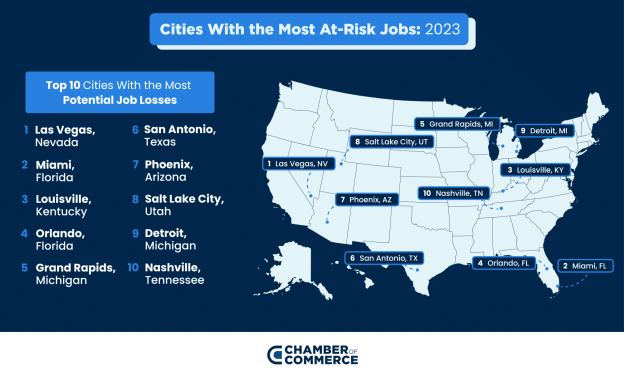In the near future, the rapid advancements in artificial intelligence have left us wondering, which jobs will be most vulnerable to this ever-evolving technology by 2023? As AI continues to revolutionize industries, bringing automation and efficiency to our daily lives, it is essential to examine the potential impact on employment. From manufacturing to customer service, healthcare to transportation, the job landscape is shifting, and it is crucial to understand how AI may disrupt traditional roles and create new opportunities.
Jobs at immediate risk
Customer service representatives
Customer service representatives are at immediate risk of being replaced by AI technology. With advancements in natural language processing and voice recognition, chatbots and virtual assistants have become increasingly sophisticated in mimicking human conversation. AI-powered chatbots can handle a wide range of customer inquiries and complaints, providing instant responses and assistance. This not only reduces the need for human customer service representatives but also offers customers a faster and more efficient experience.
Data entry clerks
Data entry clerks often perform repetitive and time-consuming tasks, such as manually inputting data into spreadsheets or databases. These tasks are highly susceptible to automation through AI technology. Machine learning algorithms can be trained to recognize patterns and extract data from various sources, eliminating the need for manual data entry. With the capability to process large volumes of data at a faster rate, AI-powered systems are poised to replace many data entry clerks in the near future.
Telemarketers
Telemarketers, who rely on making cold calls to sell products or services, are also at risk due to AI automation. AI algorithms can analyze vast amounts of customer data to identify potential leads and target specific demographics. Additionally, AI-powered chatbots and virtual assistants can handle initial interactions with customers, reducing the need for human telemarketers. The ability of AI systems to personalize and optimize marketing messages makes them compelling alternatives to telemarketers.
Bank tellers
Bank tellers face the threat of AI automation as well. With the rise of mobile and online banking, many routine banking transactions can now be conducted without the need for human assistance. Self-service kiosks and ATMs have already replaced some tasks traditionally performed by bank tellers, such as cash withdrawals and deposits. Furthermore, AI-powered chatbots can handle basic customer inquiries regarding account balances and transactions, reducing the need for human bank tellers.
Retail salespersons
The retail industry is experiencing a significant transformation due to AI technology. With the advent of online shopping platforms and personalized recommendation engines, the role of in-store retail salespersons is becoming less crucial. AI algorithms can analyze customer preferences and purchase histories to deliver personalized recommendations and promotions. Moreover, self-checkout systems and cashierless stores are on the rise, further diminishing the demand for human retail salespersons.
Jobs in transportation and logistics
Truck drivers
Truck drivers, who are responsible for transporting goods between locations, are facing potential disruption from autonomous vehicles. Self-driving truck technology is rapidly advancing, with several companies already conducting trials and deploying autonomous trucks on public roads. The autonomous trucking industry aims to improve efficiency and reduce costs by eliminating the need for human drivers. While fully autonomous trucks may still be a few years away from widespread adoption, the potential impact on truck drivers cannot be ignored.
Delivery and courier drivers
Similar to truck drivers, delivery and courier drivers are at risk of being replaced by autonomous vehicles, drones, and delivery robots. Companies such as Amazon and Google are continuously exploring and investing in autonomous delivery technologies. Delivery drones and sidewalk robots can navigate urban environments and complete last-mile deliveries, reducing the need for human drivers. As these technologies continue to mature and overcome regulatory challenges, the demand for human delivery and courier drivers may decline.
Warehouse workers
The rise of warehouse automation and AI-powered robots poses a potential threat to warehouse workers. Robotic systems can perform tasks such as picking, sorting, and packing goods with greater speed and accuracy than human laborers. AI algorithms optimize warehouse operations, improving inventory management and reducing errors. As more warehouses embrace automation to improve efficiency, the demand for manual labor may decrease, impacting the jobs of warehouse workers.
Flight attendants
Flight attendants, though not immediately threatened by AI automation, may face changes in their roles due to technological advancements. AI-powered systems can enhance flight safety by analyzing data from sensors and making real-time recommendations. Additionally, AI chatbots can provide passengers with information and assistance during flights, reducing the reliance on flight attendants for certain tasks. While human flight attendants will still play a vital role in ensuring passenger comfort and safety, the introduction of AI technology may shift their responsibilities.
Cargo and freight agents
The role of cargo and freight agents, who handle administrative tasks related to shipping and transportation, could be impacted by AI automation. AI algorithms can streamline logistics operations by optimizing routes, reducing costs, and enhancing supply chain management. Automated systems can handle documentation, track shipments, and handle customs procedures. These advancements may lead to a decrease in the need for human cargo and freight agents, as AI technology can efficiently handle a significant portion of their responsibilities.
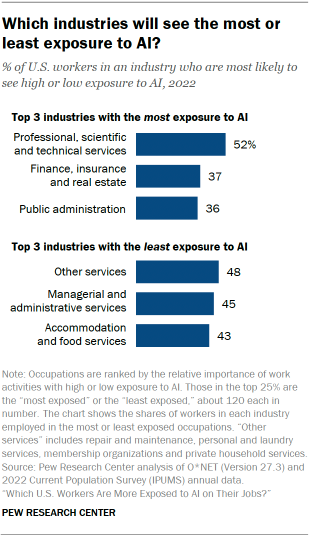
This image is property of www.pewresearch.org.
Jobs in manufacturing and production
Machine operators
Machine operators in manufacturing industries may face challenges as AI technology advances. With the introduction of smart manufacturing systems, AI-powered machines can increasingly perform complex tasks independently. These machines leverage computer vision and machine learning algorithms to analyze products, detect defects, and make adjustments in real-time. As AI technology continues to evolve, it may eliminate the need for human machine operators in certain manufacturing processes.
Assemblers
Assemblers, who work on assembly lines to put together components and products, may see their roles impacted by AI automation. Robots equipped with AI technology can perform repetitive assembly tasks with greater precision and speed. Machine learning algorithms enable these robots to learn and adapt to new assembly processes, making them versatile replacements for human assemblers. While human assemblers may still be needed for more intricate assembly tasks, the demand for manual labor in assembly lines may decrease.
Quality control inspectors
Quality control inspectors, responsible for ensuring products meet specific standards, may face challenges as AI technology advances. AI-powered systems can analyze large volumes of data to detect defects and anomalies in products. Machine learning algorithms can be trained to identify patterns and compare product characteristics to pre-established benchmarks. This automated quality control process reduces the need for human inspectors, as AI can quickly and accurately identify and address quality issues.
Packaging and filling machine operators
Packaging and filling machine operators are at risk of being replaced by AI-powered systems. These systems use computer vision algorithms to recognize packaging materials, handle product placement, and inspect packaging integrity. AI technology allows packaging and filling machines to adapt to different packaging requirements and work at a faster pace. With the ability to automate various packaging processes, AI-powered systems may substantially decrease the demand for human operators.
Process technicians
Process technicians, who monitor and control industrial processes, may experience changes in their roles due to AI automation. AI algorithms can collect and analyze data from sensors and instruments to optimize process parameters. Machine learning models can predict process failures and recommend preventive measures to minimize downtime. As AI systems become more sophisticated, human process technicians may transition to more supervisory roles, overseeing AI-powered systems and ensuring their proper functioning.
Jobs in the healthcare industry
Medical transcriptionists
Medical transcriptionists, who transcribe dictated recordings by healthcare professionals, face potential disruption from AI speech recognition technology. AI algorithms can analyze and convert spoken words into written text with high accuracy, reducing the need for manual transcription. As healthcare providers adopt AI-powered transcription systems, the demand for human medical transcriptionists may decline. However, human medical transcriptionists can still contribute by reviewing and editing AI-generated transcriptions for accuracy and completeness.
Radiologists
Radiologists, who use medical imaging technology to diagnose and interpret images, may see changes in their roles due to AI advancements. AI-powered image recognition systems can analyze vast amounts of medical images and detect subtle abnormalities that may go unnoticed to human eyes. These AI systems can provide radiologists with valuable insights and help expedite the diagnosis process. While AI technology cannot entirely replace radiologists, it can enhance their capabilities and assist in more accurate and efficient diagnoses.
Pharmacy technicians
The role of pharmacy technicians may be impacted by the introduction of AI automation. AI-powered systems can handle tasks such as dispensing medications, managing inventory, and interacting with patients. These systems can process prescriptions, check for drug interactions, and provide patients with medication-related information. While human pharmacy technicians will still play a crucial role in medication management, AI technology can streamline and augment their responsibilities.
Lab technicians
Lab technicians, responsible for conducting various laboratory tests and experiments, may experience changes in their roles due to AI automation. AI-powered systems can automate certain laboratory processes, from sample preparation to data analysis. Robotic systems can handle pipetting, mixing, and measuring tasks with precision and accuracy. AI algorithms can analyze test results and identify abnormalities or patterns. As AI technology evolves, lab technicians may transition to more specialized tasks that require human expertise and decision-making skills.
Medical billers and coders
AI technology has the potential to impact the role of medical billers and coders in healthcare organizations. AI algorithms can analyze medical records and automatically assign appropriate diagnostic and procedural codes, ensuring accuracy and reducing the time-consuming nature of manual coding. These systems can also assist in claims processing and billing accuracy checks. While human medical billers and coders may still be needed for complex cases and exceptions, AI automation can significantly enhance efficiency and accuracy in medical coding and billing processes.
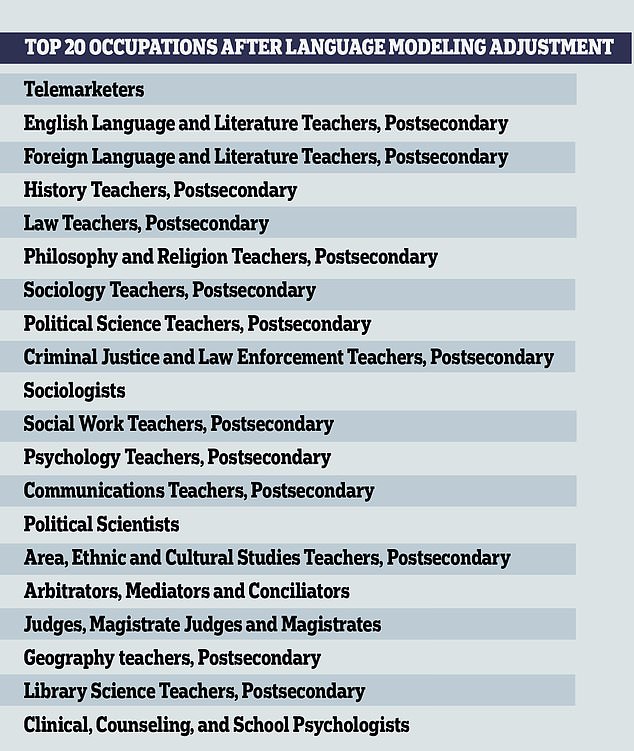
This image is property of i.dailymail.co.uk.
Jobs in finance and accounting
Bookkeepers
Bookkeepers, who record financial transactions and maintain financial records, may face disruption from AI technology. AI-powered accounting software can automate various bookkeeping tasks, such as data entry, transaction categorization, and financial report generation. These systems can integrate with banks and financial institutions to pull transaction data automatically, eliminating the need for manual data entry. While human bookkeepers may still be required for certain tasks, the demand for manual bookkeeping may decline with the introduction of AI automation.
Accounting clerks
Similar to bookkeepers, accounting clerks may see changes in their roles due to AI automation. AI-powered accounting systems can analyze financial data, identify trends and anomalies, and generate financial reports. Machine learning algorithms can categorize transactions, reconcile accounts, and identify potential errors or discrepancies. As AI technology advances, accounting clerks may transition to more analytical and advisory roles, leveraging AI-generated insights to provide financial recommendations and strategic guidance.
Payroll clerks
Payroll clerks, who are responsible for processing and managing employee payroll, may face the impact of AI automation. AI-powered systems can streamline payroll processes, from calculating hours worked to deducting taxes and generating pay stubs. These systems can automate payroll tax filings and ensure compliance with labor laws and regulations. While human payroll clerks may still be needed for handling exceptions and resolving complex payroll issues, AI automation can significantly reduce manual payroll processing tasks.
Financial analysts
Financial analysts may experience changes in their roles as AI technology advances. AI-powered algorithms can analyze financial data, identify market trends, and generate investment recommendations. These systems can process vast amounts of data from diverse sources, providing valuable insights to support financial decision-making. While human financial analysts will still play a vital role in interpreting and contextualizing AI-generated insights, the integration of AI technology can augment their analytical capabilities and enhance the accuracy of financial analysis.
Tax preparers
The role of tax preparers may be impacted by AI automation in the future. AI-powered tax preparation software can analyze financial data, identify eligible deductions and credits, and generate accurate tax returns. These systems can stay updated with the latest tax laws and regulations, ensuring compliance and minimizing errors. While human tax preparers may still be needed for complex tax situations and providing personalized advice, AI automation can simplify and expedite the tax preparation process for many individuals and small businesses.
Jobs in the legal sector
Paralegals
Paralegals, who assist lawyers in legal research, document preparation, and case management, may be affected by AI technology. AI-powered systems can automate legal research by analyzing vast amounts of legal documents, court cases, and precedents. These systems can generate legal briefs, contracts, and other legal documents with high accuracy. While human paralegals will remain crucial in providing expertise and judgment, AI automation can streamline certain aspects of their work, allowing them to focus on more complex legal tasks.
Legal secretaries
Legal secretaries, responsible for handling administrative tasks in law firms, may face changes in their roles due to AI automation. AI-powered tools can automate many administrative tasks, such as document management, scheduling, and client communication. These tools can draft emails and responses based on templates, manage calendars, and organize case-related documents. While human legal secretaries will still be essential for providing support and coordinating activities, the integration of AI technology can improve efficiency and reduce the administrative burden.
Court clerks
AI automation can impact the role of court clerks, who handle administrative tasks in court proceedings. AI-powered systems can analyze legal documents, categorize and retrieve case-related information, and assist in case management. These systems can generate court forms and other standardized documents, reducing the time and effort required for manual tasks. While human court clerks will still be needed for overseeing court procedures and providing guidance, AI automation can enhance efficiency in managing court records and administrative duties.
Lawyers (to a certain extent)
AI technology has the potential to augment the work of lawyers, assisting in legal research, document review, and case analysis. AI-powered systems can analyze legal precedents, identify relevant cases, and extract relevant information from vast amounts of legal documents. Natural language processing algorithms can analyze contracts and legal texts, identifying potential risks or ambiguities. While AI technology can enhance efficiency and accuracy in legal tasks, the expertise, judgment, and client interaction skills of human lawyers will remain essential.
Legal researchers
Legal researchers, who conduct comprehensive research on legal topics and provide analysis, may experience changes in their roles with the advancements in AI technology. AI-powered systems can analyze vast amounts of legal data and research papers, extracting key insights and summarizing legal arguments. These systems can expedite the research process and provide lawyers and legal professionals with valuable information to support their cases. While human legal researchers will still play a crucial role in interpreting and validating AI-generated insights, the integration of AI technology can improve research efficiency and enhance accuracy.
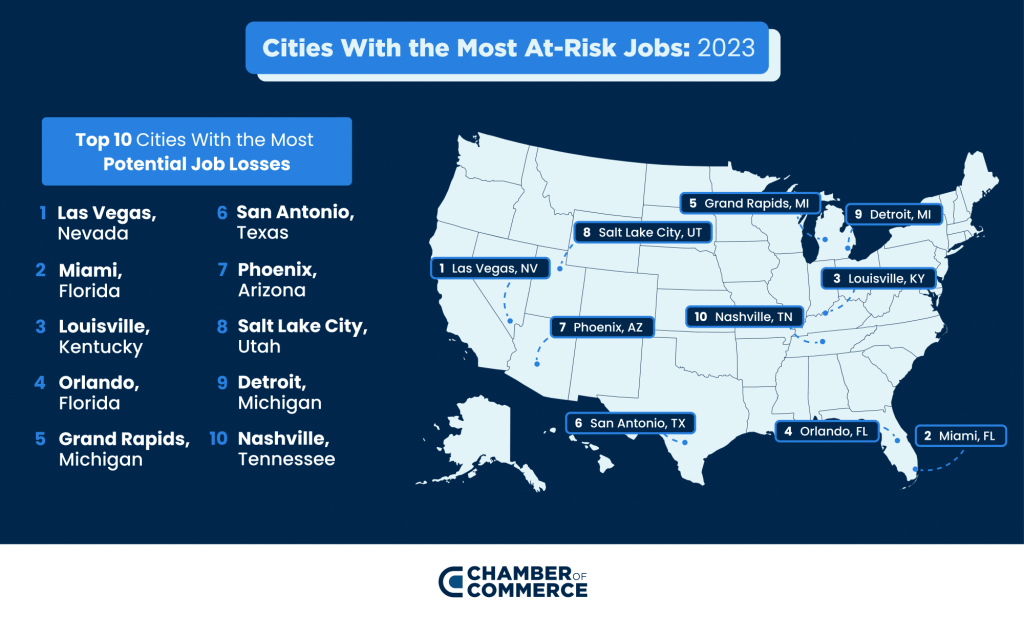
This image is property of www.chamberofcommerce.org.
Jobs in customer service
Call center operators
Call center operators are at risk of being replaced by AI-powered chatbots and virtual assistants. These AI systems can handle customer inquiries, provide information, and resolve issues with minimal human intervention. AI technologies such as natural language processing enable chatbots to understand and respond to customer queries accurately and efficiently. While human call center operators may still be necessary for complex cases and specialized support, AI automation can significantly reduce the need for manual customer service assistance.
Customer support specialists
Customer support specialists, who provide specialized assistance and solutions to customers, may see changes in their roles due to AI automation. AI-powered systems can handle a wide range of customer inquiries and resolve common issues without human intervention. Natural language processing algorithms enable these systems to understand and respond to customer requests with high accuracy and efficiency. While human customer support specialists will still be needed for complex and personalized assistance, AI automation can handle a significant portion of routine customer queries.
Technical support specialists
Technical support specialists may experience changes in their roles with the advancements in AI technology. AI-powered systems can analyze technical documents, troubleshoot common technical issues, and provide step-by-step instructions for problem resolution. These systems can also use machine learning algorithms to learn from previous technical support interactions and improve their responses over time. While human technical support specialists will remain essential for complex technical issues and specialized guidance, AI automation can enhance efficiency and minimize response times for routine technical support.
Receptionists
Receptionists may face changes in their roles as AI technology evolves. AI-powered chatbots can handle initial interactions with visitors, answering frequently asked questions, and directing them to appropriate departments or individuals. These chatbots can also schedule appointments, manage calendars, and handle basic administrative tasks. While human receptionists will still be necessary for personalized assistance and more complex inquiries, AI automation can improve efficiency in managing front desk operations and reduce the workload on human receptionists.
Help desk operators
Help desk operators, responsible for providing technical assistance and resolving IT-related issues, may be impacted by AI automation. AI-powered systems can analyze knowledge bases, troubleshoot common IT problems, and provide users with step-by-step solutions. These systems can also integrate with remote access tools to provide remote assistance and control. While human help desk operators will still be needed for complex and specialized technical support, AI automation can enhance first-level support and improve response times for routine IT issues.
Jobs in data analysis and research
Market research analysts
Market research analysts may face changes in their roles as AI technology advances. AI-powered systems can analyze vast amounts of consumer data, social media trends, and market research reports to identify insights and patterns. These systems can generate reports and recommendations based on data analysis, providing valuable inputs for strategic decision-making. While human market research analysts will still play a crucial role in interpreting and contextualizing AI-generated insights, the integration of AI technology can streamline data analysis processes and enhance the accuracy of market research.
Data analysts
Data analysts, who collect, analyze, and interpret complex data sets, may experience changes in their roles due to AI automation. AI-powered systems can handle data cleaning, data preprocessing, and basic data analysis tasks with greater speed and accuracy. Machine learning algorithms can identify correlations and patterns in large data sets, enabling predictive modeling and analysis. While human data analysts will still be crucial for complex analysis and decision-making, AI automation can enhance their capabilities and expedite data processing and preparation.
Statisticians
Statisticians, who specialize in the collection and interpretation of quantitative data, may face changes in their roles as AI technology advances. AI-powered systems can perform statistical analyses, test hypotheses, and generate predictive models based on large data sets. These systems can automate data visualization, generate reports, and assist in deriving insights from complex data. While human statisticians will still be essential for designing experiments and validating AI-generated insights, AI automation can improve efficiency in statistical analysis and modeling tasks.
Economic researchers
Economic researchers may see changes in their roles with the integration of AI technology. AI-powered systems can analyze vast amounts of economic data, financial reports, and market trends to identify patterns and correlations. Machine learning algorithms can assist in economic forecasting, macroeconomic modeling, and economic impact analysis. While human economic researchers will still be crucial for interpreting and contextualizing AI-generated insights, AI automation can streamline data analysis and assist in generating accurate economic forecasts.
Survey researchers
Survey researchers, responsible for designing and conducting surveys to collect data, may experience changes in their roles due to AI advancements. AI-powered systems can automate survey design, administer surveys electronically, and analyze the collected data. Natural language processing algorithms can extract key information from open-ended survey responses, enabling qualitative analysis at scale. While human survey researchers will still be essential for research design and interpreting survey results, AI automation can streamline survey administration and data analysis processes.
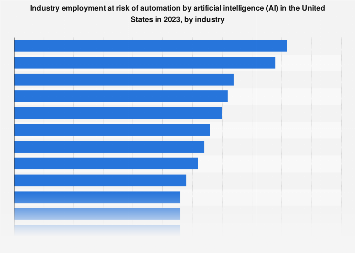
This image is property of cdn.statcdn.com.
Jobs in the creative field
Graphic designers
Graphic designers may see changes in their roles as AI-powered tools and software become more sophisticated. AI algorithms can analyze design trends, generate design concepts, and automate certain design processes. While human graphic designers will still be essential for creative ideation and complex design tasks, AI automation can assist in providing design suggestions, automating repetitive design tasks, and enhancing overall design efficiency.
Copywriters
Copywriters, responsible for creating written content for various mediums, may experience changes in their roles due to AI automation. AI-powered natural language generation algorithms can produce coherent and persuasive written content based on specific guidelines and inputs. These algorithms can analyze large amounts of data to generate personalized and engaging copy. While human copywriters will still be needed for creative and strategic content development, AI automation can assist in generating rough drafts, content suggestions, and automated copywriting.
Artificial intelligence-generated content creators
AI technology has the potential to create content independently, posing a potential challenge for content creators in various industries. AI-powered natural language generation systems can produce written articles, news updates, and even creative works such as poems and stories. These systems can analyze vast amounts of data, learn from patterns, and generate coherent and contextually relevant content. While human creativity and originality will remain valuable, AI-generated content may impact certain areas of content creation and distribution.
Film and video editors
Film and video editors may see changes in their roles with the advancement of AI-powered video editing tools. AI algorithms can analyze videos, identify key scenes, and automate certain editing processes such as color correction, stabilization, and transitions. These tools can even assist in generating automated video summaries or highlights. While human film and video editors will still be essential for creative storytelling and complex editing tasks, AI automation can improve efficiency and streamline certain aspects of the editing process.
Photographers
Photographers may experience changes in their roles as AI technology evolves. AI-powered cameras and image processing algorithms can enhance image quality, improve focus and exposure, and even automatically detect and remove unwanted elements from photos. AI systems can also assist in image categorization, organization, and post-processing. While human photographers will still be crucial for capturing unique perspectives and creative composition, AI automation can enhance image quality and simplify certain aspects of the photographic workflow.
Jobs in the food service industry
Fast food workers
Fast food workers may face the potential impact of AI automation in the future. AI-powered systems can automate certain aspects of the fast food service, such as taking orders through self-service kiosks or mobile apps. Additionally, robotic systems can handle food preparation tasks, such as burger flipping or pizza assembly, with speed and accuracy. While human fast food workers may still be necessary for customer interactions, maintaining cleanliness, and handling complex tasks, AI automation can significantly impact routine tasks within the fast food industry.
Baristas
Baristas in coffee shops and cafes may experience changes in their roles as AI automation continues to advance. AI-powered coffee machines can prepare customized drinks based on customer preferences, leveraging machine learning algorithms to learn from individual orders. These machines can produce consistent coffee quality and reduce wait times. While human baristas will still be valued for their expertise in creating unique coffee blends and providing personalized customer experiences, AI automation can streamline and expedite the drink preparation process.
Chefs
Chefs may face changes in their roles with the introduction of AI automation in restaurant kitchens. AI-powered cooking systems can assist in recipe development, ingredient measurement, and cooking techniques. These systems can generate suggestions for flavor combinations and assist in creative menu development. Robotic systems can perform repetitive cooking tasks with precision and accuracy, reducing manual labor requirements. While human chefs will remain essential for culinary creativity, innovation, and specialized techniques, AI automation can enhance efficiency and consistency in the food preparation process.
Wait staff
Wait staff in restaurants may experience changes in their roles with the integration of AI technology. AI-powered table ordering systems can enable customers to place orders directly from their smartphones or tablets, minimizing the need for human wait staff to take orders. Additionally, AI-powered systems can assist in table management, suggesting optimal seating arrangements and estimating wait times. While human wait staff will still be needed for personalized customer service, menu recommendations, and order delivery, AI automation can increase efficiency and enhance the dining experience.
Restaurant managers
Restaurant managers may face changes in their roles with the implementation of AI technology in the food service industry. AI-powered systems can assist in inventory management, analyzing sales data, optimizing menu pricing, and forecasting demand. These systems can generate real-time data insights and recommendations, enabling managers to make informed decisions. While human restaurant managers will still be vital for strategic planning, staff supervision, and overall customer experience management, AI automation can streamline certain managerial tasks and improve operational efficiency.
In conclusion, AI technology has the potential to transform various industries and impact numerous job roles. While the integration of AI automation may lead to changes and displacements in certain jobs, it also presents opportunities for new job roles and the enhancement of existing ones. The evolving relationship between humans and AI calls for adaptability, upskilling, and the exploration of how AI can augment human capabilities rather than replace them entirely. As AI technology continues to develop and mature, it is crucial for individuals and organizations to embrace the opportunities and challenges presented by this transformative technology.
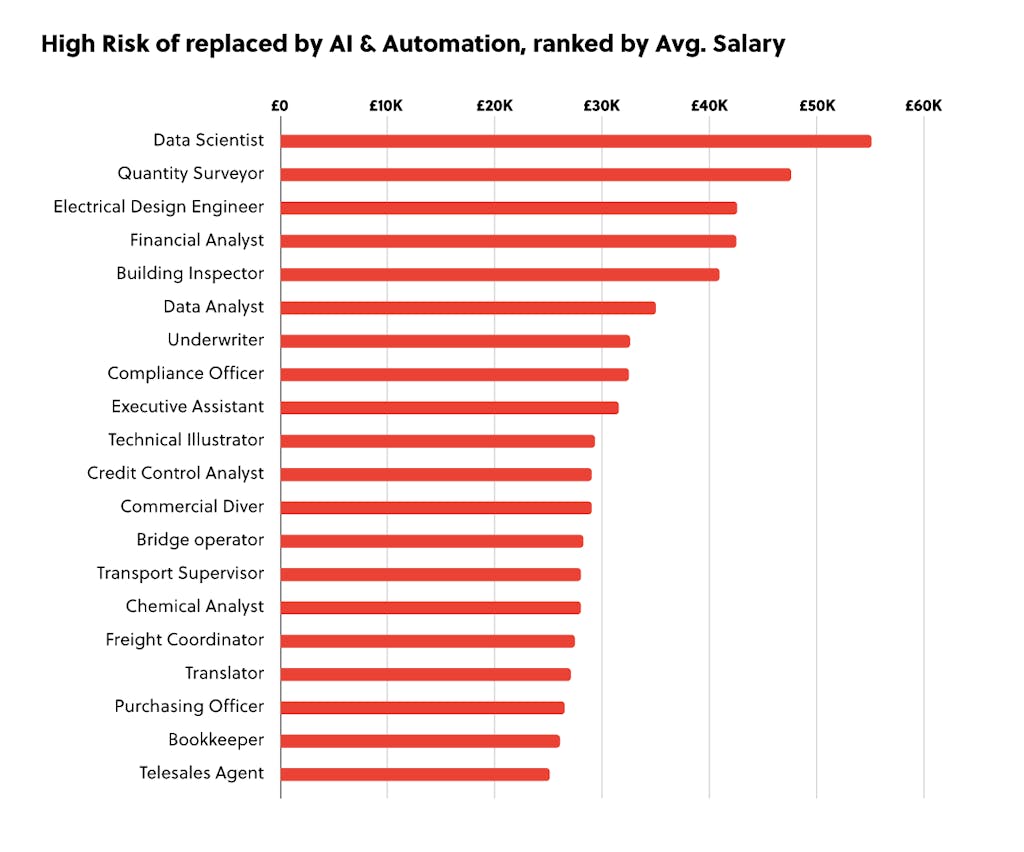
This image is property of nvc-blog.imgix.net.
